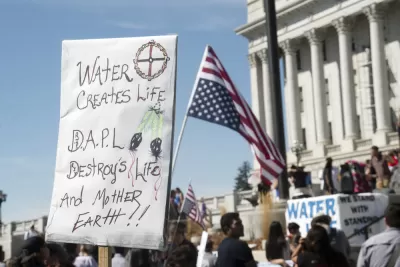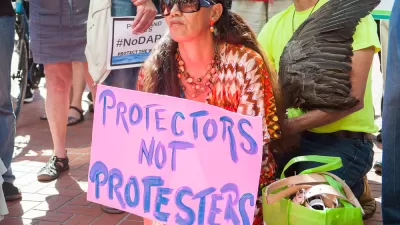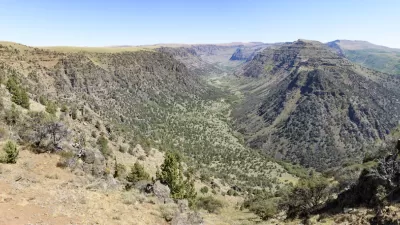Two of the most controversial pipeline projects in the United States were dealt massive blows within the span of 24 hours.

The nation woke this morning to news that a federal judge had ruled against the Trump administration and ordered the Dakota Access Pipeline shut down and emptied of oil by August 5. An environmental impact statement for the project will be next, according to the ruling.
Amy Sisk reports:
The $3.8 billion pipeline built by developer Energy Transfer has been moving Bakken oil to a shipping point in Illinois for three years. But U.S. District Judge James Boasberg, who is overseeing the lawsuit, in March ordered the U.S. Army Corps of Engineers to complete a full Environmental Impact Statement. The question of whether the pipeline would be shut down in the meantime had lingered since.
An EIS is a much more stringent review than the Environmental Assessment the Corps completed earlier. Such a study is expected to take 13 months, Boasberg wrote in the ruling he issued Monday.
The Dakota Access Pipeline captured national media attention as environmentalists and local Native American tribes united to oppose the project, and encountered stiff resistance from authorities during the fall, winter, and spring of 2016-2017.
Just one day earlier, the developers of the Atlantic Coast Pipeline, which had won a key Supreme Court victory in June, decided to cancel the project. The Atlantic Coast Pipeline attracted controversy for proposing to cross the Appalachian Trail on its journey between West Virginia and North Carolina.
"Duke Energy and Dominion Energy said that lawsuits, mainly from environmentalists aimed at blocking the project, had increased costs to as much as $8 billion from about $4.5 billion to $5 billion when it was first announced in 2014," reports Ivan Penn on the latest development in the Atlantic Coast Pipeline's story. "Dominion also said on Sunday that it was selling all of its gas transmission and storage assets to an affiliate of Warren Buffett’s Berkshire Hathaway in a deal valued at $9.7 billion."
FULL STORY: Federal judge orders Dakota Access Pipeline shut down

Alabama: Trump Terminates Settlements for Black Communities Harmed By Raw Sewage
Trump deemed the landmark civil rights agreement “illegal DEI and environmental justice policy.”

Planetizen Federal Action Tracker
A weekly monitor of how Trump’s orders and actions are impacting planners and planning in America.

The 120 Year Old Tiny Home Villages That Sheltered San Francisco’s Earthquake Refugees
More than a century ago, San Francisco mobilized to house thousands of residents displaced by the 1906 earthquake. Could their strategy offer a model for the present?

San Francisco Opens Park on Former Great Highway
The Sunset Dunes park’s grand opening attracted both fans and detractors.

Oregon Legislature to Consider Transit Funding Laws
One proposal would increase the state’s payroll tax by .08% to fund transit agencies and expand service.

Housing Vouchers as a Key Piece of Houston’s Housing Strategy
The Houston Housing Authority supports 19,000 households through the housing voucher program.
Urban Design for Planners 1: Software Tools
This six-course series explores essential urban design concepts using open source software and equips planners with the tools they need to participate fully in the urban design process.
Planning for Universal Design
Learn the tools for implementing Universal Design in planning regulations.
Clanton & Associates, Inc.
Jessamine County Fiscal Court
Institute for Housing and Urban Development Studies (IHS)
City of Grandview
Harvard GSD Executive Education
Toledo-Lucas County Plan Commissions
Salt Lake City
NYU Wagner Graduate School of Public Service





























